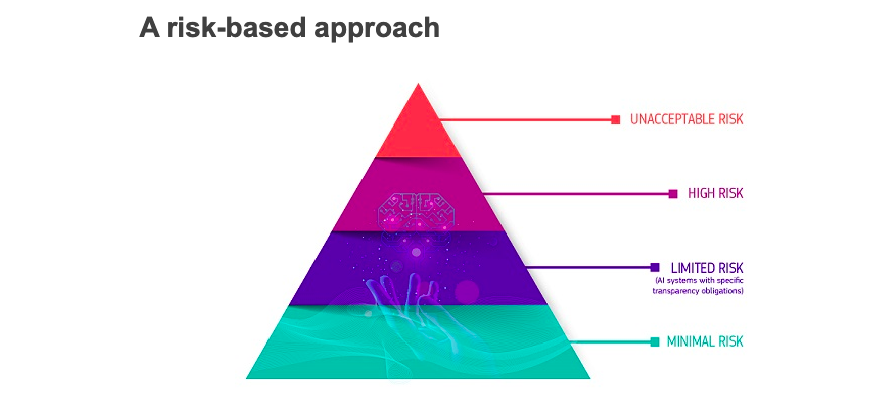Artificial intelligence regulation, here’s what the EU Parliament has decided

The EU Parliament has approved the regulation on artificial intelligence by a large majority, but facial recognition systems create tensions and nothing is taken for granted yet. Here are details and controversies
Yesterday in Strasbourg a further step forward was taken on the regulation that aims to establish the limits of artificial intelligence. The European Parliament has in fact approved the AI Act, the first bill in the world that defines a common regulatory framework for chatbots such as OpenAI's ChatGpt, Google's Bard or Microsoft's Bing.
To enter into force, however, the law must also be approved by the Council of the European Union, with which trilogues are foreseen, i.e. the interinstitutional negotiations of the EU, which began yesterday evening immediately after the vote.
The aim is to reach the milestone before the next European elections to be held from 6 to 9 June 2024.
THE VOTE
With 499 votes in favour, 28 against and 93 abstentions, yesterday the EU Parliament gave its blessing to the text of the AI Act, on which the European institutions have been working for more than two years now. But the arrival of ChatGpt and the like on the market has imposed a necessary acceleration.
Approved the regulation on #Artificial Intelligence ! pic.twitter.com/P3Ft3LaoeD
— Brando Benifei (@brandobenifei) June 14, 2023
THE BETRAYAL OF THE EPP
An approval, therefore, with a very large majority in which only the European People's Party (EPP), so to speak, "distinguished" which, according to Eunews , with "amendments presented at the last minute" attempted to withdraw "by breaking the pact with other political groups".
In fact, the group presented amendments – which were later rejected – to allow the use of real-time facial recognition cameras in public spaces. A practice deemed unacceptable by the AI Act.
"What we saw today is that it is always better to respect the agreements, otherwise we risk losing face", commented the MEP, also interviewed by Start , Brando Benifei of the Pd, co-rapporteur of the law text together with Dragoş Tudorache by Renew Europe.
WHAT THE AI ACT PROHIBITS
The changes to the text previously discussed instead concerned precisely an expansion of the bans on the intrusive and discriminatory uses of AI. In particular, MEPs have included among the practices to be banned:
- the use of “real-time” remote biometric identification systems in spaces accessible to the public;
- the use of "subsequent" remote biometric identification systems in spaces accessible to the public, unless prior judicial authorization is strictly necessary to investigate a specific serious crime;
- biometric categorization systems based on sensitive characteristics (e.g. gender, race, ethnicity, citizenship, religion, political orientation);
- predictive policing systems (based on profiles, location or past criminal behaviour);
- emotion recognition systems used in law enforcement, border management, workplace and educational institutions;
- and the untargeted mining of biometric data from the Internet or CCTV footage to create facial recognition databases (in violation of human rights and the right to privacy).
The level of risk of artificial intelligence will be established with a scale divided into four levels: minimum, limited, high and unacceptable.
RISK LEVELS
For systems where the risk is low, such as AI-enabled games and spam filters, no action is taken. In the case of limited risk, for example chatbots, transparency obligations are required.
High-risk technologies – such as scoring school and professional exams, sorting resumes, evaluating the reliability of evidence in court, robot-assisted surgery – must, however, be regulated. In this category, MEPs also added AI systems used to influence voters and the outcome of elections, and recommendation systems used by social media platforms (with over 45 million users). They also ask that technologies that cause significant damage to the health, safety, fundamental rights of people or the environment be included.
Finally, systems whose risk is considered unacceptable, i.e. anything that represents a "clear threat to people's security, livelihoods and rights", such as the assignment of a 'social score ' by of governments and real-time biometric identification (facial recognition) systems in public spaces, are prohibited with few exceptions.
Among these, the European Commissioner for Competition Margrethe Vestager cited , for example, cases where the police are "looking for a child or if there is a terrorism emergency with people fleeing to find". Vestager then added that on the issue "Parliament has a different opinion while the Council is in line with the position of the Commission" and therefore "it will depend on the negotiations where the meeting point will be found in the coming weeks and months".

THE USE OF AI ON MIGRANTS
Biometric identification systems are also at the center of discussion due to their use at borders and, therefore, towards migrants. Together with other NGOs , he spokespersons for the Amnesty International cause, which welcomes yesterday's decision by the EU Parliament but hopes that the final text of the AI Act will completely ban facial recognition because "there is no solution to make the use of remote biometric identification is compatible with respect for human rights”.
“While banning abusive surveillance is a welcome step in the right direction, this does not represent a total victory. Parliament – said an Amnesty consultant – has not banned automated risk assessment and profiling systems, as well as forecasting systems used to limit, prohibit and prevent border movements. It is essential that, while the AI Act moves towards the final negotiations, the legislators of the European Union do not neglect the rights of migrants".
This is a machine translation from Italian language of a post published on Start Magazine at the URL https://www.startmag.it/innovazione/regolamento-intelligenza-artificiale-ecco-cosa-ha-deciso-il-parlamento-ue/ on Thu, 15 Jun 2023 09:53:24 +0000.
